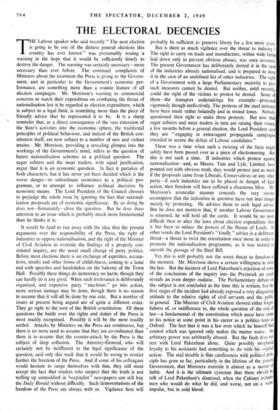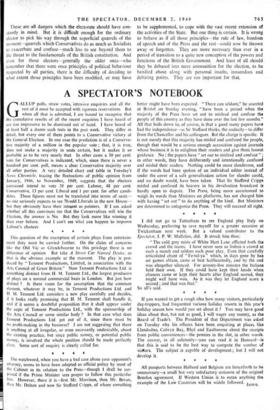THE ELECTORAL DECENCIES T HE Labour speaker who said recently "
The next election is going to be one of the dirtiest general elections this country has ever known " was presumably issuing a warning in the hope that it would be sufficiently timely to destroy the danger. The warning was certainly necessary—more necessary than ever before. The continual complaints of Ministers about the treatment the Press is giving to the Govern- ment, and in particular to the Government's economic per- formance, are something more than a routine feature of all election campaigns. Mr. Morrison's warning to commercial concerns to watch their expenditure on combating the threat of nationalisation lest it be regarded as election expenditure. which is subject to a legal limit, is something more than the piece of friendly advice that he represented it to be. It is a sharp reminder that, as a direct consequence of the vast extension of the State's activities into the economic sphere, the traditional principles of political behaviour, and indeed of the British con- stitution itself, are now subject to a number of new and violent strains. Mr. Morrison, providing a revealing glimpse into the workings of the Government's mind, refers to the question of future nationalisation schemes as a political question. The sugar refiners and the meat traders, with equal justification, argue that it is an economic question. In fact it partakes of both characters, but it has never yet been decided which is the worse danger—to subordinate economics to a political pro- gramme. or to attempt to influence political decisions by economic means. The Lord President of the Council chooses to prejudge the whole issue by ignoring the fact that national- isation proposals are of economic significance. By so doing he does not—fortunately--close the question. But he does draw attention to an issue which is probably much more fundamental than he thinks it is.
It would be fatal to run away with the idea that the present arguments over the responsibility of the Press, the right of industries to oppose nationalisation, and the right of the Minister of Civil Aviation to override the findings of a properly con- stituted inquiry, are the usual small change of party politics. Before most elections there is an exchange of asperities, accusa- tions, insults and other forms of childishness, coming to a lame end with speeches and handshakes on the balcony of the Town Hall. Possibly these things do democracy no harm, though they can hardly do it any good. When such irrelevance is deliberately organised, and expensive party " machines " go into action, more serious damage may be done, though there is no reason to assume that it will all be done by one side. But a number of issues at present being argued are of quite a different order. They go right to the root of the British constitution. Of these questions the battle over the rights and duties of the Press is most readily recognised. Possibly it will be the most readily settled. Attacks by Ministers on the Press are continuous, but there is no more need to assume that they are co-ordinated than there is to assume that the counter-attack by the Press is the subject of deep collusion. The Attorney-General, who will certainly not be indifferent to the legal significance of the question, said only this week that it would be wrong to restrict further the freedom of the Press. And if some of his colleagues would hesitate to range themselves with him, they still must accept the fact that readers who suspect that the truth is not welling up unmuddied in `capitalist " newspapers can still buy the Daily Herald without difficulty. Such demonstrations of the freedom of the Press are always with us. Vigilance here will probably be sufficient to preserve liberty for a few more years.
But is there as much vigilance over the threat to industry The right to carry on trade and manufacture, within wide limits laid down only to prevent obvious abuses, was once assumed. The present Government has deliberately denied it in the case of the industries already nationalised, and is prepared to deny it in the case of an undefined list of other industries. The right of a Government with a large Parliamentary majority to pass such measures cannot be denied. But neither, until recently, could the right of the victims to protest be denied. Some of them—the transport undertakings for example—protested vigorously though ineffectively. The protests of the steel industry have been made rather belatedly and in muted tones. Nobody questioned their right to make these protests. But now that sugar refiners and meat traders in turn are raising their voices, a few months before a general election, the Lord President says they are " engaging in extravagant propaganda campaigns intended to secure the defeat of Labour candidates."
There was a time when such a twisting of the facts might safely have been passed over as a piece of electioneering. But this is not such a time. If industries which protest against, nationalisation—and, as Messrs. Tate and Lyle, Limited, haw pointed out with obvious truth, they would protest just as much if the proposals came from Liberals, Conservatives or any other party—if such industries are to be placed in danger of legal action, then freedom will have suffered a disastrous blow. Mr. Morrison's avuncular manner conceals the very sinister assumption that the industries in question have run into danger merely by protesting. He advises them to seek legal advice. But he does not mention that, if another Labour Government is returned, he will hold all the cards. It would be no more difficult then to alter the laws about election expenditure than it has been to reduce the powers of the House of Lords. It other words the Lord President's " kindly " advice is a deliberate threat—a threat to twist the constitution once more in order to promote the nationalisation programme, as it was twisted to smooth the passage of the Steel Bill.
Yet this is still probably not the worst threat to freedom at the moment. Mr. Morrison shows a certain willingness to twist the law. But the incident of Lord Pakenham's rejection of song of the conclusions of the inquiry into the Prestwick air crash reveals an even deeper malaise. The Parliamentary debate on the subject is not concluded at the time this is written, but the first stages of the incident had already exposed a very disquieting attitude to the relative rights of civil servants and the public in general. The Minister of Civil Aviation showed either forget- fulness of, or indifference to, the whole question of the ruled law—a fundamental of the constitution which must have come to his notice at some point in his career as a politics tutor at Oxford. The fact that it was a law over which he himself had control which was ignored only makes the matter worse. An arbitrary power was arbitrarily abused. But the fault does not rest with Lord Pakenham alone. Quite possibly misplaced loyalty to his assistants had something to do with his original action. The real trouble is that carelessness with political prin ciple has gone so far, particularly in the lifetime of the present Government, that Ministers override it almost as a matter of habit. And it is the ultimate cynicism that there should lx talk of Lord Pakenhant's dismissal, when the Cabinet includes men who would do what he did, and worse, not on a warm impulse, but in cold blood. These are all dangers which the electorate should have con- .tantly in mind. But it is difficult enough for the ordinary elector to pick his way through the superficial quarrels of the moment—quarrels which Conservatives do as much as Socialists to exacerbate and confuse—much less to see beyond them to the threat to the fundamentals of the British constitution. And even for those electors—generally the older ones—who remember that there were once principles of political behaviour respected by all parties, there is the difficulty of deciding to what extent those principles have been modified, or may have to be supplemented, to cope with the vast recent extension of the activities of the State. But one thing is certain. It is wrong to behave as if all those principles—the rule of law, freedom of speech and of the Press and the rest—could now be thrown away or forgotten. They are more necessary than ever in a period of transition to a quite new conception of the powers and functions of the British Government. And least of all should they be debased into mere ammunition for the election, to be bandied about along with personal insults, innuendoes and debating points. They are too important for that.



































 Previous page
Previous page